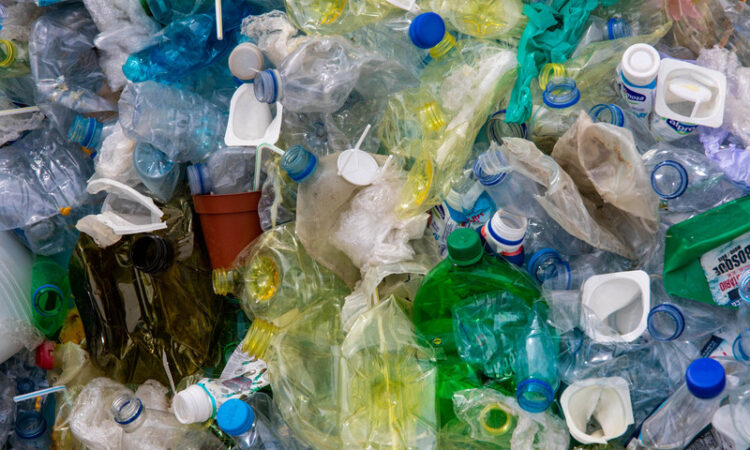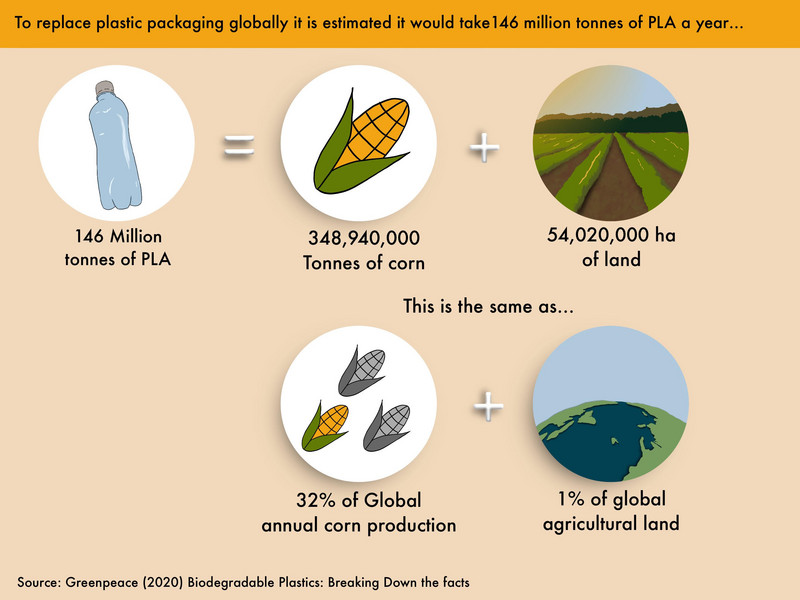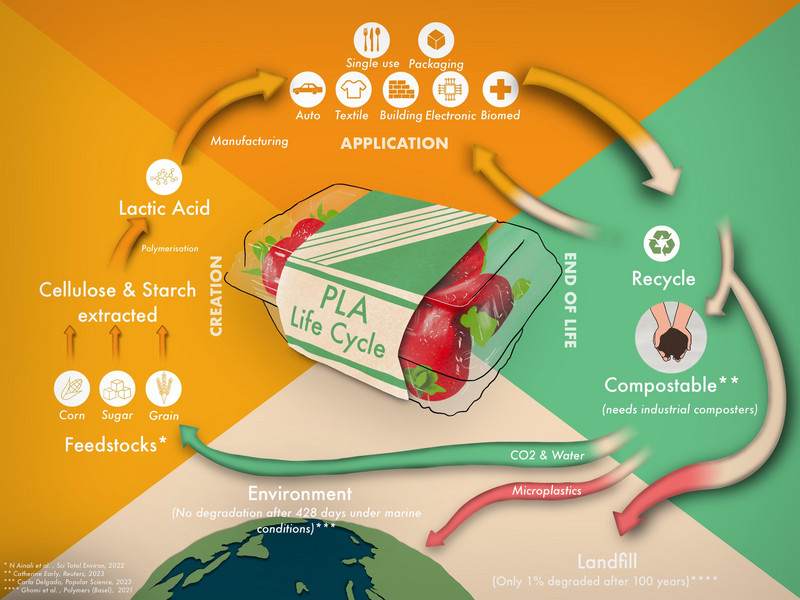
Millions of taxpayer euros are invested into packaging innovations that are not in line with the EU’s circularity policy.
A funding body established and governed jointly by the European Commission and an industry group awarded numerous grants to research and develop packaging products that lack proper disposal options in the common market.
In 2021, the EU passed a regulation establishing the Circular Bio-based Europe Joint Undertaking (CBE JU), meant to contribute to developing “renewable bio-based products, materials, processes and nutrients from waste and biomass through sustainability and circularity-driven innovation”.
This entity funded 22 packaging innovation projects.
But EUobserver found that a third of them develop single-use plastics from renewable resources — a substitution that is criticised and restricted by the currently developed Packaging and Packaging Waste Regulation, which was recently approved by EU member states in December.

Throw-away innovation
In mid-December, a conference room in Berlin-Mitte was packed with around 350 industry, research, and policy representatives working on bioplastics — materials made from biological resources, biodegradable, or both.
Convened by one of the biggest lobby groups for bioplastics in Europe — European Bioplastics — the event focused on the advantages and sustainability of bioplastics and market developments.
Many praised the Italian market and criticised the EU for restrictions in the newest packaging regulation.
But Silvia Maltagliati from the research and development department of the European Commission was braced for criticism. “When can we expect more favourable policy decisions based on all the research that has been done in the past years?” was the most popular question for her.
Packaging is the biggest sector for bioplastics, and much of it is single-use. The exhibition room at the conference was full of bioplastic shampoo bottles, takeaway boxes, and coffee capsules without a reuse-system. Consumers are used to it, businesses ask for it, and researchers roll up their sleeves to offer them easy solutions.
Some research into single-use packaging has been funded by Horizon 2020 and Horizon Europe programmes. Almost €5m was earmarked for HICCUPS, a project aiming to produce bioplastic by capturing carbon dioxide emissions from wastewater treatment plants. The proposed material is intended to biodegrade in the environment faster than similar materials. The idea is to apply it to takeaway food packaging, among other uses. These types of products are usually consumed on the go, and soiled packaging is thrown into mixed-waste bins.
Some projects try to create bio-based, but recyclable plastic. PEF, a sugarcane-based polyester, will be developed by the €25m project, PEFeference. In 2014, multinationals Coca-Cola and Danone invested in the development of PEF by Avantium, a company owned by Shell, which coordinates both HICCUPS and PEFeference. Avantium has not replied to our questions.
The NEWPACK project team aimed to pilot compostable food packaging. “In food packaging applications, the aim was towards single use, biodegradable packages,” explains the project’s coordinator Niina Halonen from the University of Oulu in Finland. The team succeeded in developing materials that meet the composting standard.
This kind of packaging disposal works in Finland. The European Compost Network, an umbrella NGO that involves waste facilities, asked members about compostable plastics. They found that these are accepted in nearly all collection areas in Finland. Some NEWPACK project partners are based in Italy, where composting facilities are widespread.
This, however, is far from typical in Europe.
In the Netherlands, for example, biodegradable plastic cannot be disposed of in compost waste. The same is true in Germany: the national federal environmental agency says that bioplastics disrupt the composting process and contaminate the compost, so they should not be discarded this way.
The agency, waste facilities and local environmental ministries are opposed to bioplastics. The agency has stated that “biodegradable packaging offers no advantages over packaging made from conventional or bio-based plastics”. But this does not stop the German industry from producing bioplastics.
The European Commission proposed a regulation, largely supported by MEPs and government ministers, a regulation that sets packaging reduction goals and promotes a cautious approach to compostable plastic packaging. Earlier, under the so-called Single-Use Plastic directive, which regulates trade in commonly littered products, bio-based plastics were treated like fossil-based plastics.
“In general, food packaging may be single-use because of the contamination by food residues, but also the need to preserve the food content and to ensure consumer health and safety. None of these [funded] projects are fostering the use of single-use plastics as defined in the [single-use] plastic directive,” commented Commission spokesperson for environment, Daniela Stoycheva.
Yet, research commissioned by three environmental NGOs showed how food waste continues to grow alongside packaging waste, and when this waste is bio-based, it does not reduce marine litter.
Asked about the funding for innovation that may not even have access to the European market, the commission’s officer Maltagliati said: “Legislation concerns what is already in the real world. I speak more for innovation, so my department is forward-looking.” She argued that research, trade and environment authorities are not aligned in time and objectives while promoting more research into bioplastics to make them more sustainable.

Wooing industry
When the Commission joined with industry to create the CBE JU the aim was to ensure that innovation is taken up by businesses. Industry is represented by the Bio-based Industries Consortium — a group of stakeholders.
The Bio-based Industries Consortium (BIC), the industry side of the CBE JU, includes companies like consumer goods multinationals P&G and Unilever.
Unilever, which produces commonly littered packaging, has been called out for lobbying against bans on such waste. P&G has been named “the absolute worst at solving plastic pollution”.
In response to EUobserver questions, CBE JU’s communications manager Elina Zicmane said that “to help Europe’s industry transition away from fossil-based production and consumption” requires “involving brand-owner companies in CBE JU-funded projects”. In other words, the presence of influential industries should ensure that the shift to a bio-based economy happens at scale.
In CBE JU’s predecessor, the industry’s financial commitments came into question. Correspondence published online reveals the commission’s criticism of the consortium’s failure to honour its financial commitments.
The consortium’s member corporations argued that investing in the entire programme, from which competitors may benefit, would be ‘commercially unviable’, so they wanted to invest only in the projects they could benefit from. The commission gave them that option. The industry group failed to keep its promise anyway, and the commission reduced its contribution.
“There has been some confusion indeed about the definition of ‘in-kind contributions’, as these definitions have been legally fixed after the start of the partnership,” BIC’s executive director Dirk Carrez commented in response to our questions, adding that in-kind contributions can mean “building the infrastructure for demo or flagship projects/plants”.
Since then, the funding scheme has been reformed, and the word ‘circular’ added to its title. The establishing regulation specifies that the Bio-Based Industries Consortium must contribute €23.5m for administrative costs.
In an interview for the Green European Journal, plastics expert Roland Geyer warned that innovative plastic substitutes “fail to displace virgin (or single-use) products in the economy but rather are produced in addition to them”.
According to the European Environment Agency, the goal should be to recycle plastics into plastics rather than lose the energy that goes into their production by composting them.






